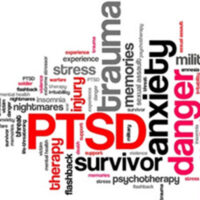The Five Kinds of PTSD

Contrary to popular myth, Post Traumatic Stress Disorder is a physical brain injury. Extreme stress, like the stress of a car crash, dog bite, or other serious personal injury, alters the brain’s chemical composition. The amygdala (part of the brain that controls emotional responses) swells, causing the hippocampus (logical responses) to shrink. The effect is like a cowboy riding a horse. If the cowboy can’t control the horse, the animal runs wild. “Wild brain” symptoms include anger, depression, nightmares, and flashbacks.
Unfortunately for victims, this common brain injury is difficult to diagnose and treat. As outlined below, PTSD could be mild or serious, and the kinds of this brain injury usually overlap. Furthermore, available PTSD medications treat the symptoms but not the injury. A San Marcos personal injury lawyer connects these victims with doctors who focus on this injury. A lawyer also obtains the compensation these victims need to properly deal with their injuries.
Normal Stress Response
NSR occurs before PTSD begins. However, it does not always lead up to the full-blown disorder. For example, events like accidents, injuries, illnesses, surgeries and other sources of unreasonable amounts of tension and stress can all lead to this response. Typically, normal stress response can be effectively managed with the support of loved ones, peers and individual or group therapy sessions. Individuals suffering from normal stress response should see a recovery within a few weeks.
Acute Stress Disorder
ASD usually occurs in people who have been exposed to what is or what feels like a life-threatening event. Natural disasters, loss of loved ones, loss of a job or risk of death are all stressors that can trigger acute stress disorder. If left untreated, acute stress disorder may actually develop into PTSD. Acute stress disorder can be treated through individual and group therapy, medication and intensive treatments designed by a psychiatrist.
Uncomplicated PTSD
The most common kind of injury-related PTSD is linked to one major traumatic event, versus multiple events. Symptoms of uncomplicated PTSD include: avoidance of trauma reminders, nightmares, flashbacks to the event, irritability, mood changes and changes in relationships. Uncomplicated PTSD can be treated through therapy, medication or a combination of both.
Complex PTSD
Complex PTSD is the opposite of uncomplicated PTSD. It is caused by multiple traumatic events, not just one. Complex PTSD is common in abuse or domestic violence cases, repeated exposure to war or community violence, or sudden loss.
This form of PTSD could also be a straw-that-breaks-the-camel’s-back brain injury. One “minor” accident could cause complicated PTSD. A San Marcos personal injury lawyer can obtain full compensation for complicated PTSD, even if pre-existing conditions contributed to it.
Treatment of complex PTSD is a little more intense than uncomplicated PTSD. For example, individuals with complex PTSD can be diagnosed with borderline or antisocial personality disorder or dissociative disorders. They exhibit behavioral issues, such as impulsivity, aggression, substance abuse or sexual impulsivity. They can also exhibit extreme emotional issues, such as intense rage, depression or panic.
Comorbid PTSD
This blanket term for co-occurring disorders applies when a person has more than one mental health concern, often coupled with substance abuse issues.
Comorbid PTSD is extremely common, as many people suffer from more than one condition at a time. For example, many people who suffer from any of the five types of PTSD self-medicate with drugs and/or alcohol. This approach is incredibly destructive in the long run.
Work With a Dedicated San Diego County Lawyer
Injury victims are entitled to substantial compensation. For a confidential consultation with an experienced personal injury lawyer in San Marcos, contact the Pursley Law Firm. Virtual, home, and hospital visits are available.
Source:
verywellmind.com/what-exactly-does-ptsd-do-to-the-brain-2797210

